PCsound ParaGraf electronic secretary, or how to automate the office in 1992
Greetings to you, my dear lovers of old iron!
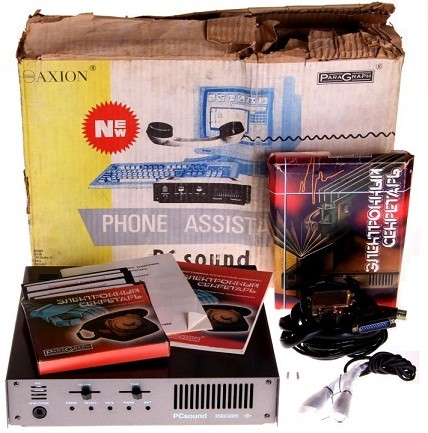
Recently, an interesting thing has come into my hands - PCsound Electronic Secretary , which has been produced in Russia since 1991.
This device was developed by Paragraph Company , and Axion took over the issue of finished products.
')
What is interesting this unit, you ask? Yes, even by the fact that it was created on the domestic element base, it began to be released in very difficult times for our country, and, most interestingly, the electronic secretary connected to a personal computer and had many functions and capabilities that would have liked many potential users. to buyers.
But first things first!
Description.
Electronic Secretary (hereinafter ES) is a set of software and hardware for personal computers, designed to work with the telephone network, recording and playing sound.
The name was not chosen randomly. The Electronic Secretary at the right time reminds you of important matters, calls at the specified time at the specified phone number and transmits your messages, while recording the answer of the subscriber, which you can listen to at any convenient time for you.

The use of ES significantly expands the capabilities of your phone. The last 9 numbers you dialed are automatically stored. You can record the most important telephone conversations and then play them.
At your disposal is always an electronic notebook in which you can easily and quickly find any entry.
In addition, you will receive a telephone answering machine, which will determine the phone number of the person calling you, and in your absence will answer the phone calls, record the received messages and transfer them to the number you specified. If you have a tone dialing device, then you can call the ES, listen to the messages recorded by the answering machine and give the phone number to which they should be transferred later, in another place.
In addition, the ES performs all functions related to the reception and transmission of facsimile messages.
If you are engaged in the creation of voiced programs (games, learning complexes, music programs), then here you will need ES. The sound prepared with its help can be used not only when working with the phone, but also in your programs. To do this, refer to the library of functions, which is part of the ES. It is necessary to take into account the fact that you can use the internal speaker of the computer.
System requirements.
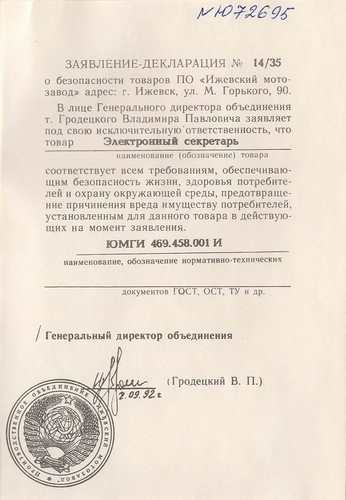
Computer running MS-DOS
IBM personal computer (models: AT or PS / 2) or IBM compatible
Discs
Hard disk and floppy drive for 3.5 'or 5.25 "floppy disks
Monitor and video adapter
Enhanced Graphics Adapter (EGA) or Video Graphics Array (VGA)
Disk memory
When installing the complex, you must have a free 2.4 MB.
Parallel port
LPT1 or LPT2
Minimum RAM
When starting the ES, 250 KB of RAM should be free.
operating system
MS-DOS 3.3 or higher versions
Equipment.
PCsound ParaGraf electronic secretary was delivered in a rather large cardboard box, inside which is located:
The instruction manual is written in Russian and contains illustrations. A set of 5 five-inch diskettes with software is packed in a separate cardboard box with color printing.
Date of manufacture of my copy - 10/30/1992
Appearance.
The body of the electronic secretary is made of aluminum and painted with powder paint.
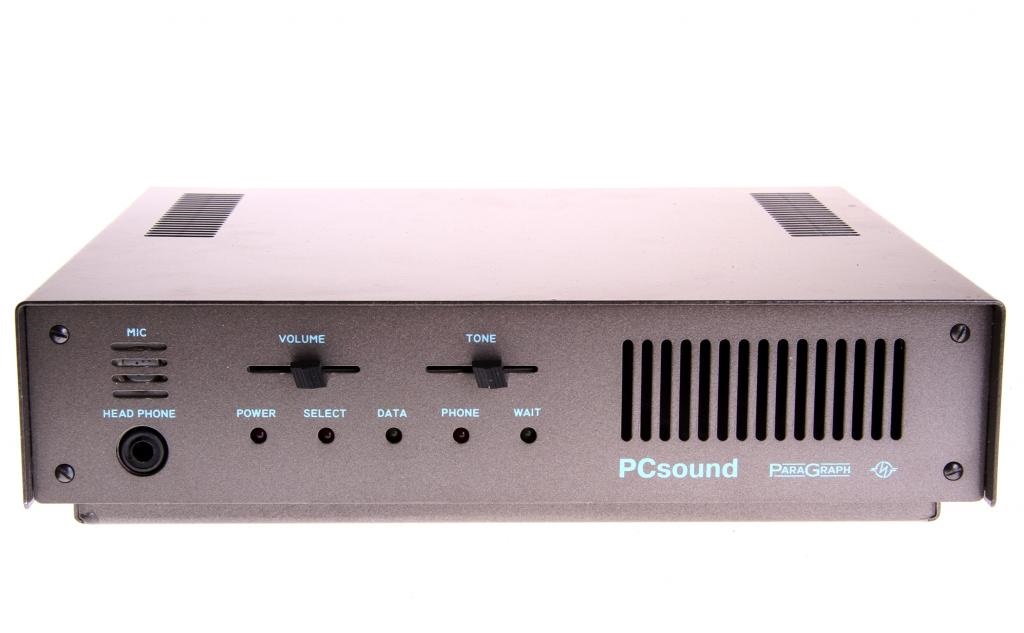
On the front are the volume and tone controls, a microphone, a headphone jack and LEDs indicating the device’s operation. Behind the "lattice" on the right side is a rather loud speaker.
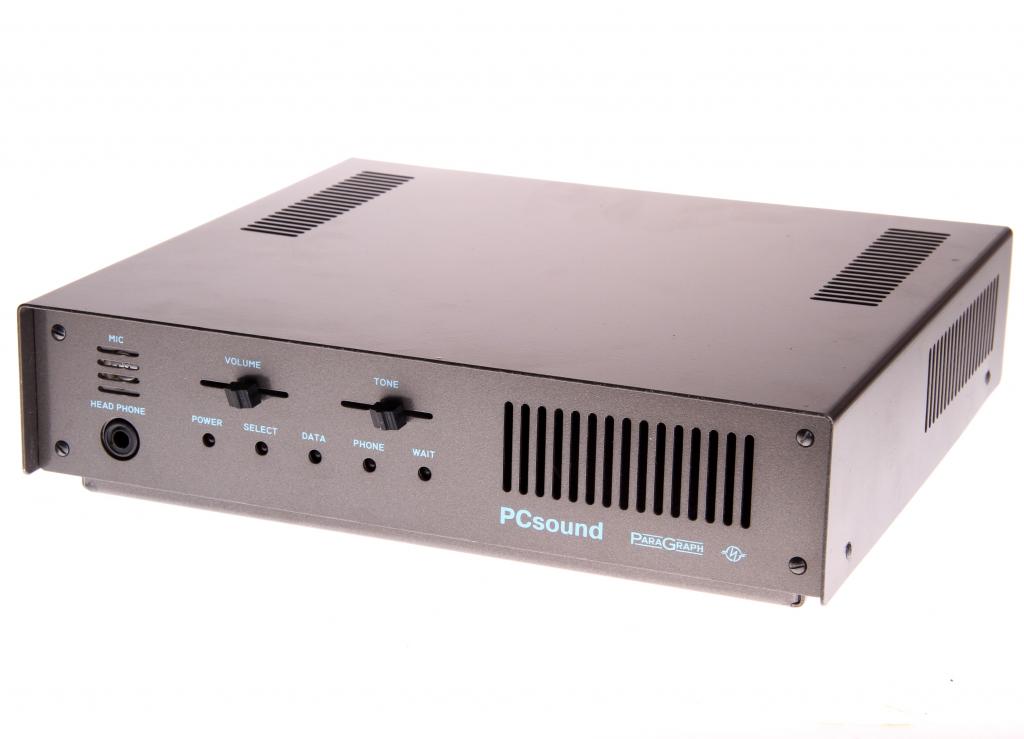
On the sides of the case, as well as on top, are located ventilation openings. Cooling inside the case is passive.

Description of the hardware.
The hardware part of the ES is called PCsound-Dev - this is a small-sized console that connects to the standard parallel port of a computer. The appearance of the console in front is shown in Fig. 1.1, and behind - on fig. 1.2.

Fig. 1.1.
1 — built-in microphone; 2 — volume control; 3 — tone control;
4 — built-in speaker; 5 — headphone jack; 6 — power on indicator; 7 — device activity indicator; 8 — computer data transfer indicator; 9 — phone power on indicator; 10 — call waiting indicator.
PCsound-Dev is used to record on the hard disk of the computer and then play sound signals. These signals can be received from the built-in or external microphone and line-in and played back to the built-in or external speaker (speaker) or through an external amplifier.
PCsound-Dev has a telephone line interface that allows it to be used as a fax machine and remotely-controlled answering machine.
The front panel has two potentiometers that regulate the volume and timbre of the sound, as well as LEDs indicating the presence of power, connection to the “ONLINE” mode, the presence of information on the line.
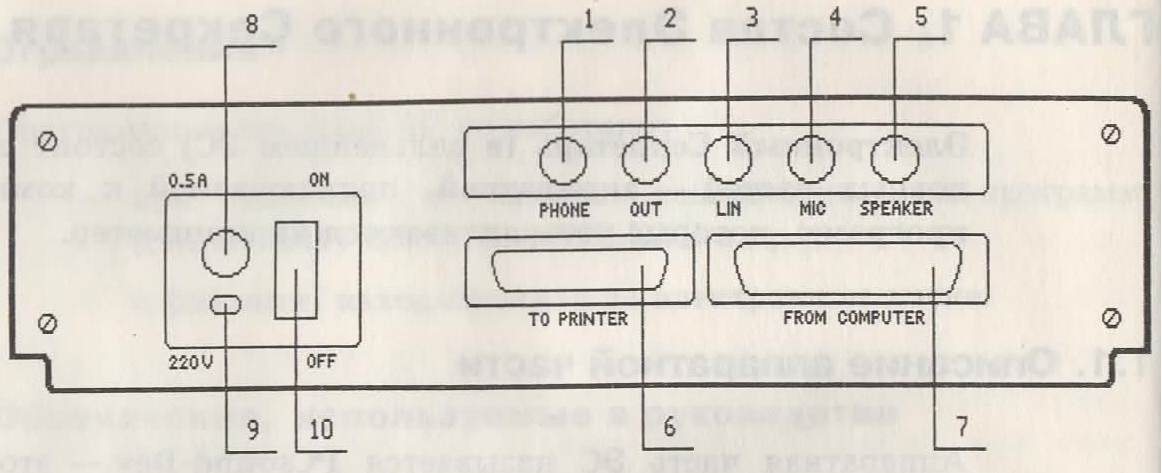
Fig. 1.2.
1 — jack for connecting to a telephone line; 2 — line output jack; 3 — line input jack; 4 — jack for connecting an external microphone; 5 — jack 'for connecting an external speaker system; b — printer connector; 7 — connector for connecting to a computer; 8 — mains fuse (0.5A); 9 — power cord; 10 — on / off toggle switch.
Software.
Do not forget that PCsound Electronic Secretary is a part of the software and hardware complex, and without the appropriate software is a high-tech stand for a hot frying pan.
The software part of the Electronic Secretary is called PCsound-Soft - this is a set of software installed on the hard disk of a computer. PCsound-Soft allows your computer to work with PCsound-Dev. PCsound-Soft includes the following components:
1. PCsound-Studio - a set of programs for recording, processing and playing audio signals.
2. PCsound-Phone - a set of programs for working with a telephone line.
3. PCsound-Res - software package for working with sound in the background.
4. PCsound-Lib-a set of programs to include sound in the programs you create.
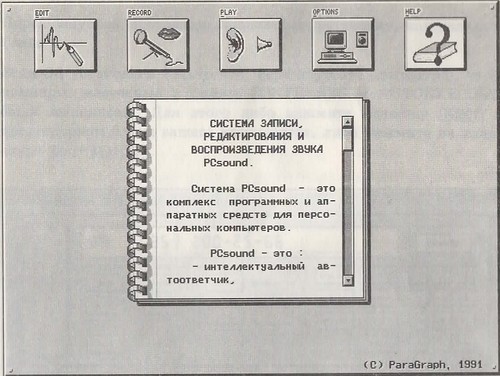
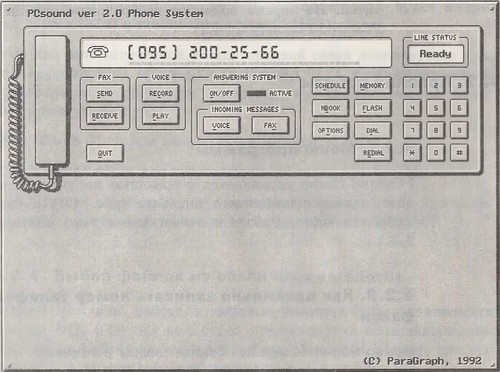
A copy of the contents of the installation floppy can be downloaded here , suddenly someone come in handy?)
Internal organization.
The electronic secretary is entirely assembled from domestic components, it can be seen in the photo below:
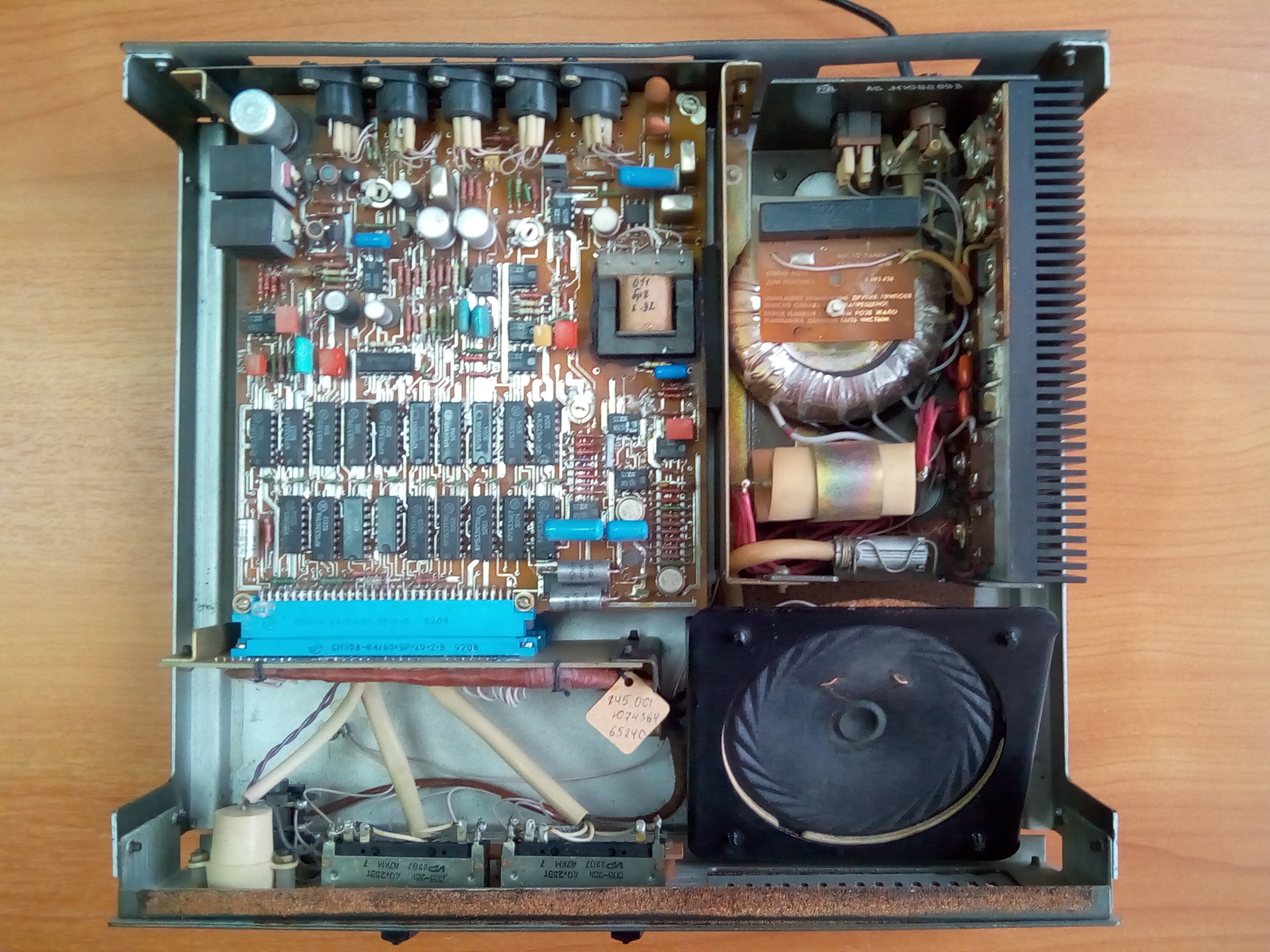
The main modules (there are only three of them) are mounted on the chassis and interconnected by means of detachable connections SNP 58-64.
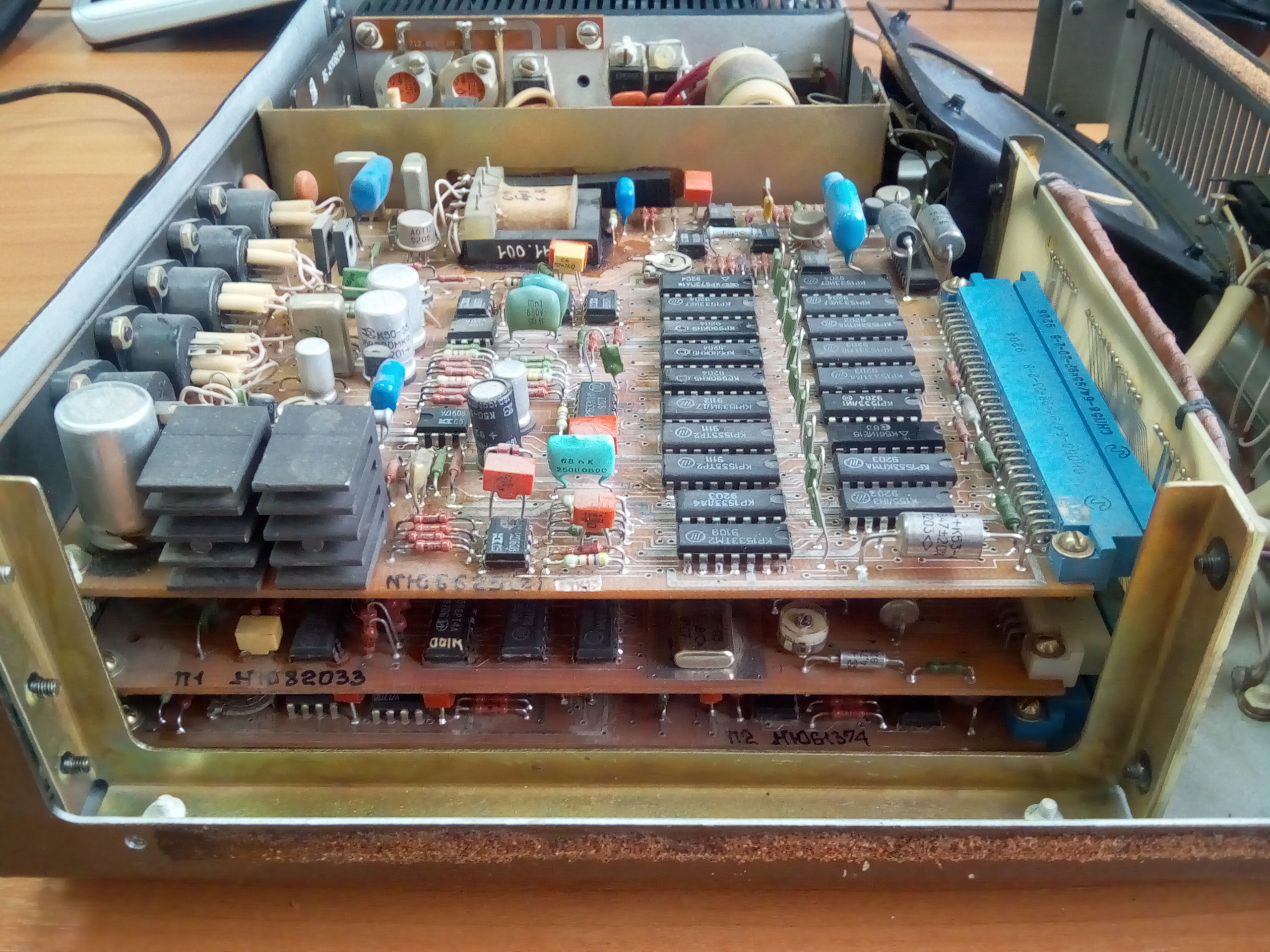
The transformer power supply still works fine, regardless of age. And if you suddenly still want to repair it, caring designers will prudently share with you an alloy of the Rose through the decades!

The developers wanted to make a truly reliable machine, and whenever possible they used the most reliable components at that time, for example, 1533 series microcircuits.

The first module in the triple sandwich of the boards is responsible for working with external sources of sound and a telephone line.
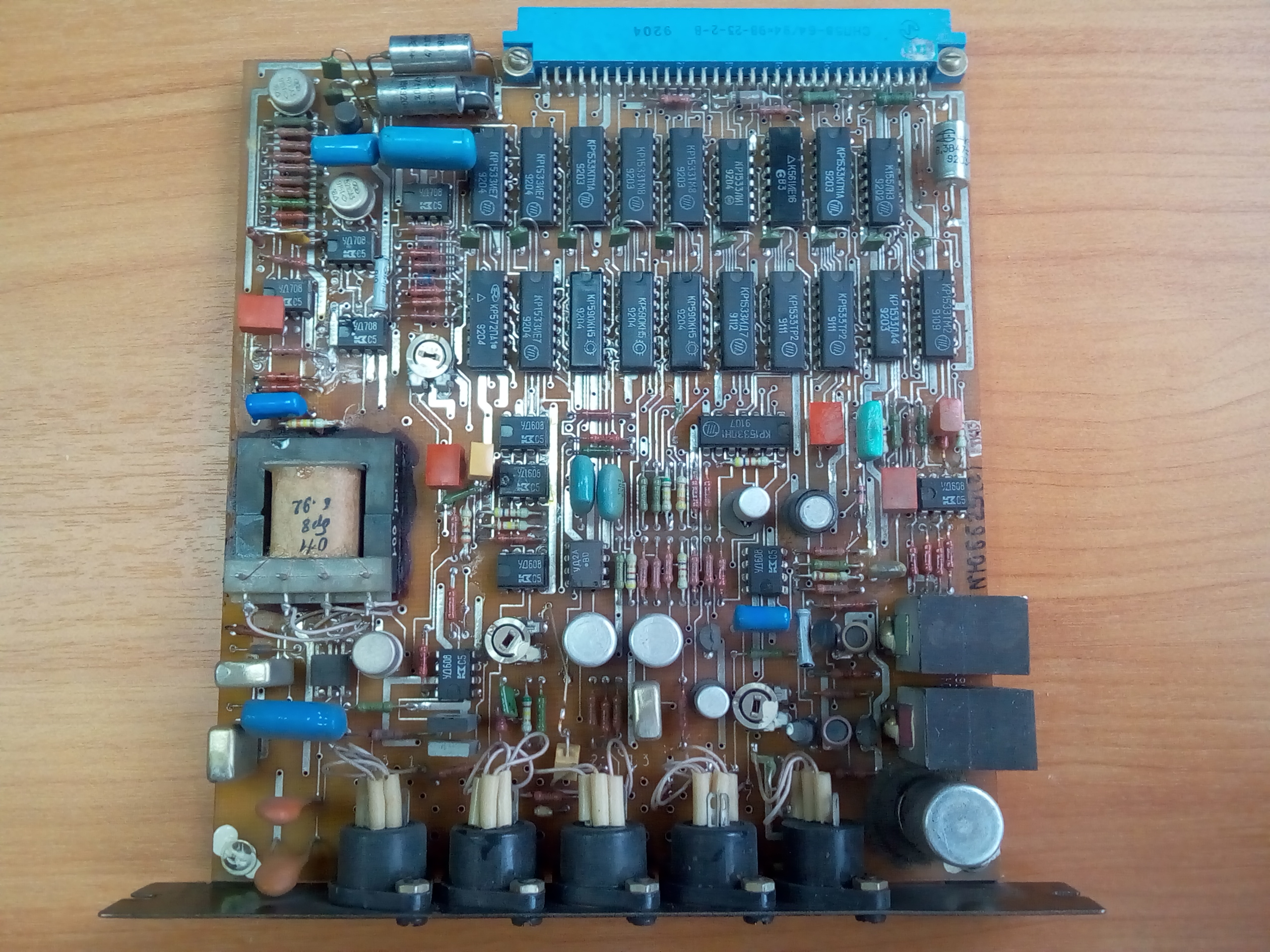
On the second board there is a harness for working with an LPT interface port and a printer port. Particular attention should be paid to the presence of microcircuits RAM KR537RU10 and ROM KR556RT17.

On the lowest board, you can find the KR573RF5 ROM chip, the only gold-plated chip in the whole device, a handful of operational amplifiers UD708, a small amount of fine logicand three dried cockroaches with a quality mark on the buzzer .

The case with the removed modular boards looks pretty impressive. Still, the use of aluminum, and not cheap plastic looks stern and Soviet!

This is where my story about the PCsound ParaGraf e-secretary is over. I hope that among the readers of Hicktimes there will be people who can tell in the comments about this device and its history, as well as about the fate of ParaGraph and Izhevsk Motor Plant in those difficult years for the country.

Recently, an interesting thing has come into my hands - PCsound Electronic Secretary , which has been produced in Russia since 1991.
This device was developed by Paragraph Company , and Axion took over the issue of finished products.
')
What is interesting this unit, you ask? Yes, even by the fact that it was created on the domestic element base, it began to be released in very difficult times for our country, and, most interestingly, the electronic secretary connected to a personal computer and had many functions and capabilities that would have liked many potential users. to buyers.
But first things first!
Description.
Electronic Secretary (hereinafter ES) is a set of software and hardware for personal computers, designed to work with the telephone network, recording and playing sound.
The name was not chosen randomly. The Electronic Secretary at the right time reminds you of important matters, calls at the specified time at the specified phone number and transmits your messages, while recording the answer of the subscriber, which you can listen to at any convenient time for you.

The use of ES significantly expands the capabilities of your phone. The last 9 numbers you dialed are automatically stored. You can record the most important telephone conversations and then play them.
At your disposal is always an electronic notebook in which you can easily and quickly find any entry.
In addition, you will receive a telephone answering machine, which will determine the phone number of the person calling you, and in your absence will answer the phone calls, record the received messages and transfer them to the number you specified. If you have a tone dialing device, then you can call the ES, listen to the messages recorded by the answering machine and give the phone number to which they should be transferred later, in another place.
In addition, the ES performs all functions related to the reception and transmission of facsimile messages.
If you are engaged in the creation of voiced programs (games, learning complexes, music programs), then here you will need ES. The sound prepared with its help can be used not only when working with the phone, but also in your programs. To do this, refer to the library of functions, which is part of the ES. It is necessary to take into account the fact that you can use the internal speaker of the computer.
System requirements.

Computer running MS-DOS
IBM personal computer (models: AT or PS / 2) or IBM compatible
Discs
Hard disk and floppy drive for 3.5 'or 5.25 "floppy disks
Monitor and video adapter
Enhanced Graphics Adapter (EGA) or Video Graphics Array (VGA)
Disk memory
When installing the complex, you must have a free 2.4 MB.
Parallel port
LPT1 or LPT2
Minimum RAM
When starting the ES, 250 KB of RAM should be free.
operating system
MS-DOS 3.3 or higher versions
Equipment.
PCsound ParaGraf electronic secretary was delivered in a rather large cardboard box, inside which is located:
- PCsound ParaGraf Electronic Secretary
- User's manual
- Interface and connecting cables
- Software kit on 5 diskettes
- Two spare fuses
The instruction manual is written in Russian and contains illustrations. A set of 5 five-inch diskettes with software is packed in a separate cardboard box with color printing.
Date of manufacture of my copy - 10/30/1992
Appearance.
The body of the electronic secretary is made of aluminum and painted with powder paint.

On the front are the volume and tone controls, a microphone, a headphone jack and LEDs indicating the device’s operation. Behind the "lattice" on the right side is a rather loud speaker.

On the sides of the case, as well as on top, are located ventilation openings. Cooling inside the case is passive.

Description of the hardware.
The hardware part of the ES is called PCsound-Dev - this is a small-sized console that connects to the standard parallel port of a computer. The appearance of the console in front is shown in Fig. 1.1, and behind - on fig. 1.2.

Fig. 1.1.
1 — built-in microphone; 2 — volume control; 3 — tone control;
4 — built-in speaker; 5 — headphone jack; 6 — power on indicator; 7 — device activity indicator; 8 — computer data transfer indicator; 9 — phone power on indicator; 10 — call waiting indicator.
PCsound-Dev is used to record on the hard disk of the computer and then play sound signals. These signals can be received from the built-in or external microphone and line-in and played back to the built-in or external speaker (speaker) or through an external amplifier.
PCsound-Dev has a telephone line interface that allows it to be used as a fax machine and remotely-controlled answering machine.
The front panel has two potentiometers that regulate the volume and timbre of the sound, as well as LEDs indicating the presence of power, connection to the “ONLINE” mode, the presence of information on the line.

Fig. 1.2.
1 — jack for connecting to a telephone line; 2 — line output jack; 3 — line input jack; 4 — jack for connecting an external microphone; 5 — jack 'for connecting an external speaker system; b — printer connector; 7 — connector for connecting to a computer; 8 — mains fuse (0.5A); 9 — power cord; 10 — on / off toggle switch.
Software.
Do not forget that PCsound Electronic Secretary is a part of the software and hardware complex, and without the appropriate software is a high-tech stand for a hot frying pan.
The software part of the Electronic Secretary is called PCsound-Soft - this is a set of software installed on the hard disk of a computer. PCsound-Soft allows your computer to work with PCsound-Dev. PCsound-Soft includes the following components:
1. PCsound-Studio - a set of programs for recording, processing and playing audio signals.
2. PCsound-Phone - a set of programs for working with a telephone line.
3. PCsound-Res - software package for working with sound in the background.
4. PCsound-Lib-a set of programs to include sound in the programs you create.


A copy of the contents of the installation floppy can be downloaded here , suddenly someone come in handy?)
Internal organization.
The electronic secretary is entirely assembled from domestic components, it can be seen in the photo below:

The main modules (there are only three of them) are mounted on the chassis and interconnected by means of detachable connections SNP 58-64.

The transformer power supply still works fine, regardless of age. And if you suddenly still want to repair it, caring designers will prudently share with you an alloy of the Rose through the decades!

The developers wanted to make a truly reliable machine, and whenever possible they used the most reliable components at that time, for example, 1533 series microcircuits.

The first module in the triple sandwich of the boards is responsible for working with external sources of sound and a telephone line.

On the second board there is a harness for working with an LPT interface port and a printer port. Particular attention should be paid to the presence of microcircuits RAM KR537RU10 and ROM KR556RT17.

On the lowest board, you can find the KR573RF5 ROM chip, the only gold-plated chip in the whole device, a handful of operational amplifiers UD708, a small amount of fine logic

The case with the removed modular boards looks pretty impressive. Still, the use of aluminum, and not cheap plastic looks stern and Soviet!

This is where my story about the PCsound ParaGraf e-secretary is over. I hope that among the readers of Hicktimes there will be people who can tell in the comments about this device and its history, as well as about the fate of ParaGraph and Izhevsk Motor Plant in those difficult years for the country.
Source: https://habr.com/ru/post/391221/
All Articles